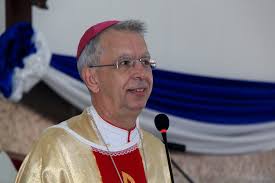Sept 2018
Priests are consecrated to be close to the people
This is the talk given by Archbishop Joseph Marino, Apostolic Nuncio to Malaysia, to the clergy at the 1st Malaysian Catholic Clergy Assembly (MCCA) on July 16 at Majodi, Plentong
The renewal in holiness given to the priest at ordination, is not a mere spiritual personal holiness nor does it guarantee moral perfection. It is a holiness, which imparts the dignity of the priesthood and assists the priest to be faithful to his ministry. He becomes another Christ for ministry, which must reflect the mission of Jesus, who came not to be served but to serve, going from village to village preaching the Good News. It is essential that we read and meditate on the recent Apostolic Exhortation of Pope Francis, Gaudete et Exsultate on holiness in today’s world. Just briefly, the Holy Father tells us that holiness is going into the world to live the Beatitudes, the radical law of the Lord, which changes the way we think and consequently the way we act.
The final part of the prayer of the consecration is profound, but simple, “May he be a faithful minister.” This phrase verifies, represents the goal, the end or the scope of becoming men of God, not for ourselves, but for others. It never means to be separated or arrogantly above the people, as if members of the clergy are perfect or ideal chaste, like a tribal priesthood. And above all, we never define our priestly ministry in terms of power; it is only one of service. Or as Pope Francis said to the Missionaries of Mercy on April 10, 2018: “Let us be careful: It is not a question of becoming ‘obsessed’ priests, as if they were depositaries of some extraordinary charism. No. Priests are normal, simple, meek, balanced people, who are capable of allowing themselves to be constantly regenerated by the Spirit, docile to his power, interiorly free — above all, of themselves, because the are moved by the ‘wind’ of that ‘blows where it wills’” (Jn 3:8).
There it is so beautifully stated, the meaning of priestly consecration: simple men (servants), regenerated by the Spirit (renewed in holiness), to an active and intimate engagement with the people (faithful ministers of service). In other words, we are consecrated to be close to the people.
Close to the People
To another Christ, who live the smell of the sheep, can only mean to be close to the people, and on this phrase, “to be close to the people,” the Holy Father devoted his entire homily at the Chrism Mass of this year (Homily on 29 March 2018).
He affirmed that to be close to the people arises from the very essence of our being anointed and sent and reflects the fundamental choice that God made in our regards. “God’s great choice” – the Pope preached – was itself “to be close to the people.” This closeness “is more than the name of a specific virtue; it is an attitude which engages the whole person, our way of relating, our way of being attentive to ourselves and to others” (Homily of 29 March 2018).
Our Holy Father went on to state that “when people say of a priest, ‘he is close to us’, they usually mean two things. The first is that ‘he is always there’ (and) the other is that he has a word for everyone.”
There are situations in which we distance ourselves from the people or they distance themselves from us. Do you know what one of them is? The homily. How many complaints are voiced about homilies throughout the whole Church! These complaints cannot be ignored. Pope Francis wrote in The Joy of the Gospel (EG), “we know that the faithful attach great importance to the homily, and that both they and their ordained ministers suffer because of homilies: the laity from having to listen to them and the clergy from having to preach them! It is sad that this is the case” (EG, n. 135).
There are many reasons for this suffering. Often it is poor delivery; often the homily is more a lecture than introducing the people to the joy of the Gospel; often they are enormously long and boring, and often they are more than one homily, but a series of unconnected ideas. I recall the story of the priest who was proud of the work he had done to prepare his homily, and after Mass, he asked a lady: “Did you like my homily?” And she answered: “Which one?”
Article reproduced from Herald Malaysia online


